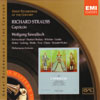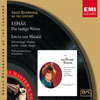Lehár Die lustige Witwe
Legendary status is here bestowed on performances of three operas in which Schwarzkopf excelled, but the truly Great Recording is her unmissable Capriccio
View record and artist detailsRecord and Artist Details
Composer or Director: Richard Strauss
Genre:
Opera
Label: Great Recordings of the Century
Magazine Review Date: 11/2000
Media Format: CD or Download
Media Runtime: 135
Mastering:
ADD
Catalogue Number: 567394-2

Tracks:
| Composition | Artist Credit |
|---|---|
| Capriccio |
Richard Strauss, Composer
Anna Moffo, Italian Soprano, Soprano Christa Ludwig, Clairon, Contralto (Female alto) Dermot Troy, Italian Tenor, Tenor Dietrich Fischer-Dieskau, Olivier, Baritone Eberhard Wächter, Count, Baritone Elisabeth Schwarzkopf, Countess Madeleine, Soprano Hans Hotter, La Roche, Bass Karl Schmitt-Walter, Major-Domo, Bass Nicolai Gedda, Flamand, Tenor Philharmonia Orchestra Richard Strauss, Composer Rudolf Christ, Taupe, Tenor Wolfgang Sawallisch, Conductor |
Composer or Director: Franz Lehár
Genre:
Opera
Label: Great Recordings of the Century
Magazine Review Date: 11/2000
Media Format: CD or Download
Media Runtime: 80
Mastering:
ADD
Catalogue Number: 567370-2

Tracks:
| Composition | Artist Credit |
|---|---|
| (Die) Lustige Witwe, '(The) Merry Widow' |
Franz Lehár, Composer
Eberhard Wächter, Danilo, Tenor Elisabeth Schwarzkopf, Hanna Glawari, Soprano Franz Böheim, Njegus, Speaker Franz Lehár, Composer Hanny Steffek, Valencienne, Soprano Hans Strohbauer, Raoul de St Brioche, Baritone Josef Knapp, Mirko Zeta, Baritone Kurt Equiluz, Cascada, Baritone Lovro von Matacic, Conductor Nicolai Gedda, Camille de Rosillon, Tenor Philharmonia Chorus Philharmonia Orchestra |
Composer or Director: Wolfgang Amadeus Mozart
Genre:
Opera
Label: Great Recordings of the Century
Magazine Review Date: 11/2000
Media Format: CD or Download
Media Runtime: 165
Mastering:
ADD
Catalogue Number: 567382-2

Tracks:
| Composition | Artist Credit |
|---|---|
| Così fan tutte |
Wolfgang Amadeus Mozart, Composer
Alfredo Kraus, Ferrando, Tenor Christa Ludwig, Dorabella, Mezzo soprano Elisabeth Schwarzkopf, Fiordiligi, Soprano Giuseppe Taddei, Guglielmo, Baritone Hanny Steffek, Despina, Soprano Karl Böhm, Conductor Philharmonia Chorus Philharmonia Orchestra Walter Berry, Don Alfonso, Bass Wolfgang Amadeus Mozart, Composer |
Author: John Steane
Ungratefully, I’m going to wish, first, that the Cosi fan tutte could have been the earlier version under Karajan (now also at mid-price from EMI), secondly that the Widow might have been a double. The two discs of this 1962 recording last in all not more than 80 minutes, and there was an earlier Widow from 1953 (11/88), also with Schwarzkopf and Gedda but conducted by Ackermann and having Erich Kunz as Danilo and Emmy Loose as Valencienne. At some stage it must have occurred to somebody as a possibility that the two recordings together might make a viable set, with just a little squeezing-up, accommodated on two CDs. That would have been a double delight, enriched by the opportunity for comparisons. With Cosi the importunate thought arises out of sheer personal preference – but it is one that the years have strengthened.
I do find, not in the singers but in Bohm’s direction, a lack of fun. His speeds are so moderate, so sensible (nothing gets out of hand). We’re talking now of a fine art, a performance which orchestrally as well as vocally has very evident distinction among its many would-be rivals; but what I get from the conducting is like a clear, intelligent reading of Jane Austen without a sense of humour.
These niggly considerations aside, delectation abounds, as in both the opera and the operetta a company of rare talent gives of its inspired best. In Lehar, the smiling voice of Gedda casts its glow over the whole party. In Mozart, his hoped-for presence proved unavailable, and by happy chance and good judgement the young Alfredo Kraus was brought in. Not a Mozart singer by training, he mastered the part and sings with the skill and style of an expert. The ripe Italianate warmth of Giuseppe Taddei raises the spirits further, and Walter Berry (after hamming his bringer-of-bad-news act so tastily that the girls should have suspected something) is a suave Alfonso. Hanny Steffek does all that is expected of her as Despina – which is a compliment if you are more susceptible than is the present writer to the charms of the soubrette. As for the ladies, they are the best wonders of art and nature combined, Ludwig a Dorabella of formidable spirit in her ‘Smanie implacibili’ vein, and Schwarzkopf a Fiordiligi whose depth of humanity and mastery of technique meet in a ‘Per pieta’ of rare beauty.
But the gift of greatest price is the Capriccio, and I imagine it will win the most gratitude. Schwarzkopf herself has said of this recording that she thinks it the best of her opera sets, ‘in all respects: conductor, orchestra, tempo, sound, balance, diction, even expression’. And she added, concerning the subject of the opera: ‘it was the argument of my life’ (
Discover the world's largest classical music catalogue with Presto Music.

Gramophone Digital Club
- Digital Edition
- Digital Archive
- Reviews Database
- Full website access
From £8.75 / month
Subscribe
Gramophone Full Club
- Print Edition
- Digital Edition
- Digital Archive
- Reviews Database
- Full website access
From £11.00 / month
Subscribe
If you are a library, university or other organisation that would be interested in an institutional subscription to Gramophone please click here for further information.




